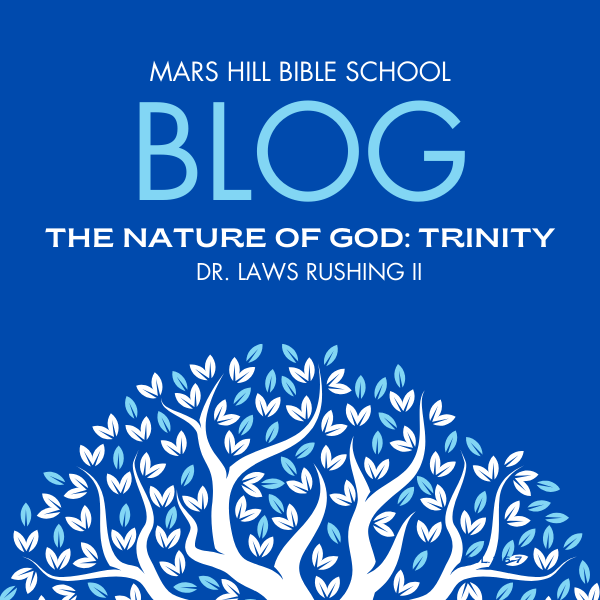MHBS Blog
The Nature of God: Trinity

The sublime and transcendent ethic of eternal love is only possible through a relation. God’s triune nature is the foundation of all love and relation.
God’s whole nature is certainly incomprehensible to our thinking. “Oh, the depth of the riches both of the wisdom and knowledge of God! How unsearchable are His judgments and His ways past finding out! “For who has known the mind of the Lord? Or who has become His counselor?” (Romans 11:33,34). ““The secret things belong to the Lord our God, but those things which are revealed belong to us and to our children forever, that we may do all the words of this law” (Deuteronomy 29:29).
God has progressively revealed His comprehensible nature in the Bible beginning with his oneness. The ancient cultural backdrop is also helpful to understand how this concept can be integrated with the seemingly paradoxical doctrine, God as one in three persons, Father, Son, and Holy Spirit.
During the time of Israel, religion was immersed in polytheism and idolatry. It was commonplace for natural elements such as the sun, moon, precious metals, and man’s art to be regarded as sacred or deity. When we read the Genesis narrative of creation, one of the drastic differences from eastern myths is the fact that God is transcendent and separate from nature itself. God’s nature was distinctly one and different from the plethora of things in creation. God stands outside of the universe and is not made or limited to space, time, and matter. This constitutes the one true essence of God.
The oneness of God is specified by both the Old and New Testaments. (Deuteronomy 6:4, 5) “Hear, O Israel: The Lord our God, the Lord is one! You shall love the Lord your God with all your heart, with all your soul, and with all your strength.”
(Isaiah 44:8-11) “Do not fear, nor be afraid; Have I not told you from that time, and declared it? You are My witnesses. Is there a God besides Me? Indeed, there is no other Rock; I know not one.’ Those who make an image, all of them are useless, And their precious things shall not profit; They are their own witnesses; They neither see nor know, that they may be ashamed. Who would form a god or mold an image That profits him nothing?”
(John 17:3) “And this is eternal life, that they may know You, the only true God, and Jesus Christ whom You have sent.” (I Timothy 2:5) “For there is one God and one Mediator between God and men, the Man Christ Jesus.” (I Thessalonians 1:9) “For they themselves declare concerning us what manner of entry we had to you, and how you turned to God from idols to serve the living and true God.”
The Bible also speaks of God in plurality. (Genesis 1:26, 27) “Then God said, ‘Let Us make man in Our image, according to Our likeness; let them have dominion over the fish of the sea, over the birds of the air, and over the cattle, over all the earth and over every creeping thing that creeps on the earth.’ So God created man in His own image; in the image of God He created him; male and female He created them.” (Isaiah 6:8) “Also I heard the voice of the Lord, saying: 'Whom shall I send, And who will go for Us?” The Scriptures reveal God as Father, Son, and Holy Spirit in one essence and being which is transcendent over space, time, and matter described as spirit. (John. 4: 24) “God is Spirit, and those who worship Him, must worship in spirit and truth.”
Church father Tertullian was responsible for coining new words in the Latin language like a spiritual Shakespeare. The word “trinitas” or trinity was crafted to describe the widespread biblical concept. (McGrath 1994)
God is revealed as Father.
Israel is called “My son, my first born” (Exodus 4:22). Isaiah further states, “But now, O Lord, You are our Father; We are the clay, and you our potter; and all we are the work of Your hand” (Isaiah 64:8). Moreover, the prophet declares, “Have we not all one Father? Has not one God created us? Why do we deal treacherously with one another by profaning the covenant of the fathers?” (Malachi 2:10) The Fatherhood of God takes even greater shape with the ministry of Christ and the New Testament. The Aramaic term “Abba” was uttered by Christ in referencing God which showcased the spiritual intimacy of Father and Son but also ushered in a new relationship with mankind. The name “Abba” is exceptional in the words of Christ. Joachim Jeremias commented, “There is not a single example of the use Abba…..as an address to God in the whole of Jewish literature.” (Jeremias 1967) The emphasis on God as Father is referenced by Christ 44 times in Matthew and 120 in John. (Metzger 1965) We find numerous references in later books. (Romans 1:7, Ephesians 4:1-4, Galatians 1:1).
God is revealed as the Son.
We see this prophetically in the Old Testament. (Psalms 2:7) “The Lord has said to Me, You are My Son, Today I have begotten You.” (Isaiah 9:6) “For unto a child is born, unto us a Son is given; and the government will be upon His shoulder: and His name will be called Wonderful, Counselor, Mighty God, Everlasting Father, Prince of peace.” The term “Son” designates his earthly life and “Word” is eternal essence with God. (John 1:1-4) “In the beginning was the Word, and the Word was with God, and the Word was God. He was in the beginning with God. All things were made through Him, and without Him nothing was made that was made. In Him was life, and the life was the light of men.” The Word “became flesh and dwelt among us” speaking of Jesus (John 1:14).
Christ displayed many hallmarks of deity. He accepted worship (Matthew 28: 17) forgave sins (Mark 2:5, Luke 7:47-50) spoke with authority on par with the Torah (Matthew 5,6, 7, John 5:39-47) and declared Himself eternal (John 17:3). Jesus also identified Himself with Jehovah God in the “I Am” statements (John 6:35, 8:12, 10:7, 10:11,14, 11:25, 14:6, 15:1).
God is revealed as the Holy Spirit.
The Bible begins with “the Spirit of God was hovering over the face of the waters” with 62 references in the Old Testament and 90 in the New Testament. (Isaiah 63:10) “But they rebelled and grieved His Holy Spirit; so He turned Himself against them as an enemy, and he fought against them.” When David lamented his egregious sin, “Do not cast me away from Your presence, and do not take Your Holy Spirit from me.” The Holy Spirit is also credited with authoring and inspiring the truth of Scripture from the prophets to the Apostles (II Peter 1:21, John 14:26, 16:13). Jesus preaches that the Holy Spirit can be blasphemed which is considered a very serious offense to God (Matthew 12:31). The Holy Spirit is given attributes of personhood such as “hears, speaks, teaches, convicts, comforts, reveals, intercedes, brings to remembrance, sends, sets elders (John 16:13, Mark 13:11, John 15:26, John 16:8, John 16:7, John 16:14, Romans 8:26, John 14:26, Acts 13: 1-4, Acts 20:28).
One of the greatest explications of the Holy Spirit as God is in Acts 5. Luke uses the terms God and Holy Spirit interchangeably. (Acts 5: 3,4) “But Peter said, Ananias, why has Satan filled your heart to lie to the Holy Spirit and keep back part of the price of the land for yourself? While it remained, was it not your own? And after it was sold, was it not under your control? Why have you conceived this thing in your heart? You have not lied to men but to God.”
The Bible also speaks of the Father, Son, and Holy Spirit in passages and narratives. One of the most vivid portrayals is the baptism of Jesus. We see all three manifested in their personhood, united will and deity. (Matthew 3: 16, 17) “When He had been baptized, Jesus came up immediately from the water; and behold, the heavens were opened to Him, and He saw the Spirit of God descending like a dove and alighting upon Him. And suddenly a voice came from heaven, saying, ‘This is My beloved Son, in whom I am well pleased.” The Scriptures also place their authority and names in unanimity. (Matthew 28:19,20) “Go therefore and make disciples of all the nations, baptizing them in the name of the Father and of the Son and of the Holy Spirit” (II Corinthians 13:14) “The grace of the Lord Jesus Christ, and the love of God, and the communion of the Holy Spirit be with you all. Amen”
Heresies arose in the church to challenge the full deity of Christ like Arianism which would destroy the biblical trinitarian understanding. The modalism heresy also confused God as one but only disclosing Himself in different situations or times as Father, Son, or Holy Spirit but not the full triune God. Lastly, tritheism- teaches three separate gods as opposed to one in being. The doctrine of trinity is not a contradiction but carefully understood by orthodox Christians that gives glory to the true living God: Father, Son, and Holy Spirit. It is through this divine relation that God’s eternal love exists.


.png)

-The Emperor’s New Clothes
Invisible cloth? What a preposterous, silly idea! Anyone with a lick of common sense should know that invisible cloth does not exist. So how did these two con artists convince everyone but a small child that invisible cloth exists? Peer pressure. They told the masses that if they could not see the invisible cloth they were stupid.
It worked.
The same can be said for the preposterous, silly concept of the Trinity: three beings in one god. Its proponents used the same tactic as the Emperor’s tailors. They proclaimed that anyone who could not understand this complicated, sophisticated theological concept is unlearned.
Stupid.
No. You are not stupid. Just as the child in the tale of The Emperor’s New Clothes, you are using common sense. Three beings are three beings. They cannot magically exist as one. Anyone who says otherwise is an invisible cloth salesman.